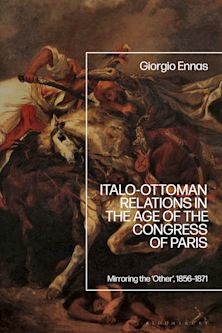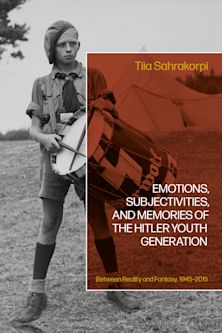- Home
- ACADEMIC
- History
- European History
- Balkan Genocides
You must sign in to add this item to your wishlist. Please sign in or create an account
Description
During the twentieth century, the Balkan Peninsula was affected by three major waves of genocides and ethnic cleansings, some of which are still being denied today. In Balkan Genocides Paul Mojzes provides a balanced and detailed account of these events, placing them in their proper historical context and debunking the common misrepresentations and misunderstandings of the genocides themselves.
A native of Yugoslavia, Mojzes offers new insights into the Balkan genocides, including a look at the unique role of ethnoreligiosity in these horrific events and a characterization of the first and second Balkan wars as mutual genocides. Mojzes also looks to the region's future, discussing the ongoing trials at the International Criminal Tribunal in Yugoslavia and the prospects for dealing with the lingering issues between Balkan nations and different religions. Balkan Genocides attempts to end the vicious cycle of revenge which has fueled such horrors in the past century by analyzing the terrible events and how they came to pass.
Table of Contents
Pronunciation Guide
Chapter 1: Definitions of Genocides and Ethnic Cleansing
Chapter 2: Heritage of Horrors
Chapter 3: Balkan Wars 1912-1913: An Unrecognized Genocide
The Carnegie Commission’s Conclusion
Epilogue: World War I as the Third Balkan War
Greek-Turkish Wars
Chapter 4 – Multiple Genocides of World War II: Western Balkans
Preliminary Philosophical and Theological Concerns
Genocide in the “Independent State of Croatia”
Genocidal Aspects of Italian Occupational Authorities in Yugoslav Lands
Slovenia
Bosnia and Herzegovina
Chapter 5: Multiple Genocides in World War II: Northeastern and Central Balkans
Belgrade and Serbia Proper
Backa and Baranja Under Hungarian Occupation
The Fate of the Yugoslav Army’s Jewish POWs
Montenegro
Albania and Kosovo
Massacres and Ethnic Cleansing by Cetniks
Genocide Against Romas (Gypsies)
Chapter 6: Multiple Genocides in World War II: Southeastern Balkans
Bulgarian Jews Not Deported to Death Camps
Macedonia
Greece under German, Italian, and Bulgarian Occupation
Chapter 7: Retaliatory Genocide against Wartime Enemies
Genocide of Yugoslavia’s Ethnic Germans
Massacres of Hungarians
Ethnic Cleansing of Italians
Bleiburg and the Fate of Ustaše and Other Militaries Collaborating with the Axis
Chapter 8: Ethnic Cleansing during Yugoslavia’s Wars of Disintegration in the 1990s
The Context
Contentious Analytical Issues
Chapter 9: War in Croatia
Overview of the War
Was it Genocide and/or Ethnic Cleansing?
Chapter 10: War in Bosnia and Herzegovina
Problems Leading to the War
Major Events of the War
The Horrors of Ethnic Cleansing
The Srebrenica Genocide
Genocidal Rape
Did Genocide Occur in Bosnia and Herzagovina?
Appendix
Chapter 11: Protracted War and Conflict in Kosovo
Overview of Serbian-Albanian Relationships in Kosovo, 1945—1999
Overview of the War, 1999
Destruction of Serbian Orthodox Holy Places
Ethnic Cleansing in Reverse
Did Genocide and/or Ethnic Cleansing Occur?
Chapter 12: International Criminal Tribunal for Former Yugoslavia
Chapter 13—Onward into the Twenty-first Century: A Postscript
Threat of Genocide Averted in Macedonia
Prospects for the Balkan
Time Line
Notes
Bibliography
Index
About the Author
Product details
| Published | Oct 16 2011 |
|---|---|
| Format | Ebook (PDF) |
| Edition | 1st |
| Extent | 1 |
| ISBN | 9798216235101 |
| Imprint | Rowman & Littlefield Publishers |
| Series | Studies in Genocide: Religion, History, and Human Rights |
| Publisher | Bloomsbury Publishing |
About the contributors
Reviews
-
Mojzes's book concerns ethnic cleansing or genocide in the Balkans three separate times in the 20th century. He bases his analysis on both primary and secondary sources, and the scope of the work as a whole is one of a region where violence built from one generation to the next. His research on the Balkan Wars (1912-13) is valuable, for while that series of conflicts has been told before, Mojzes (religious studies, Rosemont College) focuses on the killing between ethnic groups that is chilling and distinct from Great Power politics. From that point, it did not take much ignition from the Nazis to spark genocide in the region during WW II. Mojzes's discussion of the Jasenovac camps, both what the sources and the partisan politicians recount, is instructive. The author concludes with a glimpse into the genocide as Yugoslavia was breaking up, and the complexity of how to sort through such bestial killing both legally and morally. This study includes important details for scholars and students....Mojzes has written a study on which other scholars will be able to build. Summing Up: Recommended. Upper-division undergraduates and above.
Choice Reviews
-
The Balkan peninsula, with its crisscrossing mountain ranges, is divided into relatively small geographic regions and equally small religious and ethnic enclaves. Whenever the Ottoman, Austro-Hungarian, and, later, various Communist overlordships crumbled, the peoples of those divisions were free to have at each other throughout the last century. As Mojzes, a professor of religious studies at Rosemont College, indicates, the Balkans have earned “bragging rights” as a center of genocide and ethnic cleansing. Mojzes begins with a definition of terms, distinguishing between the often misunderstood differences between genocide and ethnic cleansing. He proceeds in a methodical, sometimes ponderous way to explain the causes and courses of these outrages while striving for fairness, since objectivity about such emotional issues may be impossible. Some of the events he reports, such as the cleansing and massacres during the breakup of Yugoslavia, will be familiar to most readers. Others, such as the mass expulsions and killings during the Balkan wars of 1912–13, are less well-known. A disturbing but important work about a still volatile region.
Booklist
-
With this book, Paul Mojzes has again put Eastern European scholarship in his debt....No other book offers such a thorough, careful, balanced treatment of the topic. The scholarship is sound: it is careful, even comprehensive (given the limitations of some sources), and as complete as could be hoped. This is the best book in the field. It is warmly recommended.
Occasional Papers on Religion in Eastern Europe
-
Author Paul Mojzes tests the application of the terms ‘genocide’, ‘ethnic cleansing’, and ‘holocaust’ to the twentieth-century history of South-eastern Europe. Mojzes is concerned about what he sees as the propensity for mass violence in the region in question, ‘if there were “bragging rights” for being a genocidal and ethnic cleansing area, the Balkans could claim championship status’, says Mojzes (p. 1). He looks for evidence of genocide and ethnic cleansing during the period of the Balkan wars at the beginning of the twentieth century (1912-1913) the Second World War (1941-1945), and the wars that followed the break-up of Yugoslavia at the end of the twentieth-century (1991-1999). . . To be sure, this is an important and worthwhile project.
H-Soz-Kult
-
Paul Mojzes is a well-informed and eminent historian of religion with a profound interest in the study of ethno-religion as the rationale for genocide. ... He offers his readers an excellent comprehensive and systematic, narrative of the horrific events that dominated the first and last decades of the previous century. ... His analysis and the interpretation of the different wars in the Balkans during the last century, and horrors they produces are very engaging. Mojzes' book adds greatly to our understanding of ethnic conflict and genocide. I highly recommend Balkan Genocides to anyone interested in topics of ethnic cleansing, genocide, ethno-religious nationalism, ethno-religious warfare, and cultural vandalism.
Insight
-
Balkan Genocides sets out a history of conflict, mass violence, ethnic cleansing, and genocide in the Balkans throughout the Twentieth Century. It is an extremely useful text, providing an overview of such events during that period, and offers readers more of a contextual conception of conflicts in the region. . . .In writing this book, Mojzes is clearly driven by a passion for justice and truth — an acknowledgment of wrongs — as a way to move forward and attempt to clear the hostilities of the past. . . .Balkan Genocides is a valuable contribution to the literature, and will be of use on the shelf of any scholar or practitioner in the fields of genocide studies, history, political science, international law, religion, socio-cultural anthropology, and sociology.
E-International Relations




























